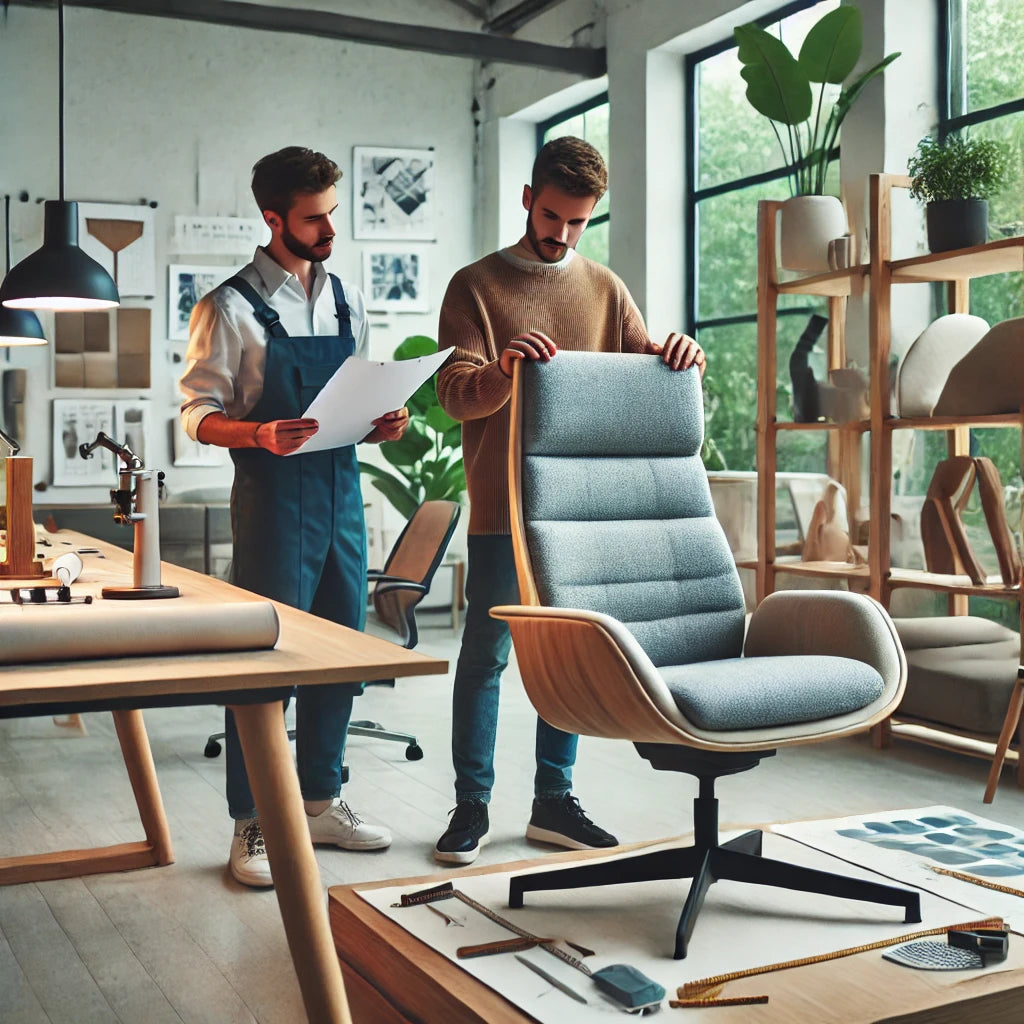In today’s business landscape, an office is more than just a workspace, it is a direct reflection of a company’s values, culture, and identity.
While decor and design elements play a significant role in shaping perceptions, custom office furniture stands out as one of the most effective tools to showcase a brand’s personality. Thoughtfully chosen furniture not only enhances functionality but also communicates the essence of your brand to employees, clients, and visitors.
This blog explores how custom office furniture can embody your brand’s personality and offers actionable insights into designing a workspace that aligns with your company’s identity.
Why Custom Office Furniture Matters

Offices are no longer generic spaces filled with uniform desks and chairs. Today, companies strive to create environments that are both functional and representative of their unique identity. Here’s why custom office furniture is an essential investment:
-
Reflecting Brand Identity: Custom furniture allows businesses to incorporate their logo, brand colors, and design elements into the workspace. This reinforces brand consistency and creates a cohesive experience.
-
Enhancing Employee Productivity: Ergonomically designed furniture tailored to your team’s needs can boost comfort and productivity. Custom pieces ensure that functionality meets form.
-
Impressing Clients and Visitors: A unique office design makes a strong first impression. Custom furniture showcases professionalism and creativity, setting your business apart from competitors.
-
Adapting to Unique Needs: Not all office spaces are created equal. Custom furniture can be designed to fit specific layouts, accommodate particular workflows, and address storage requirements effectively.
-
Promoting Sustainability: Many companies are adopting eco-friendly practices. Custom furniture can incorporate sustainable materials and processes, aligning your brand with green initiatives.
Using Custom Furniture to Reflect Brand Personality

To create an office that resonates with your brand, it’s essential to translate abstract brand values into tangible design elements. Here’s how custom office furniture can help:
1. Align Furniture Design with Brand Values
Your brand’s core values should guide every design decision. For instance:
-
Innovation-Focused Brands: Opt for futuristic designs, modular furniture, and high-tech features to highlight your commitment to innovation.
-
Eco-Conscious Companies: Use reclaimed wood, bamboo, or other sustainable materials to reflect your environmental values.
-
Luxury Brands: Incorporate premium materials like leather, marble, or polished metal to convey opulence and sophistication.
2. Leverage Brand Colors and Themes
Integrating your brand’s color palette into furniture design is a simple yet impactful way to reinforce identity. From accent chairs in bold brand colors to understated wooden desks with subtle hints of your theme, custom furniture offers endless possibilities.
-
Example: A tech company with a vibrant and energetic brand might choose furniture in bright colors and modern shapes.
-
Example: A law firm aiming to project trust and professionalism may favor dark woods and classic designs.
3. Prioritize Functionality with Personality
Custom furniture should not compromise on functionality. Pieces that seamlessly integrate style and utility are ideal.
-
Adjustable desks with unique finishes reflect adaptability.
-
Storage units with intricate designs add visual appeal while maintaining practicality.
-
Collaborative workstations designed to encourage teamwork embody a brand’s emphasis on collaboration.
4. Tell a Story Through Design
Every brand has a story, and custom furniture can serve as a medium to tell it. Incorporate elements that represent your journey, heritage, or mission.
-
Example: A family-run business could use handcrafted furniture to reflect its artisanal roots.
-
Example: A global corporation might feature design elements inspired by different cultures where it operates.
5. Focus on the Employee Experience
A brand’s personality is not just outward-facing; it also influences internal culture. Custom furniture that prioritizes employee comfort and well-being can:
-
Boost morale and productivity.
-
Showcase a brand’s commitment to its people.
-
Reinforce core values like inclusivity and innovation.
For example, a company that values creativity might incorporate unconventional seating arrangements or artistic furniture pieces to inspire employees.
6. Create Zones That Reflect Brand Functions
Different areas of an office serve different purposes, and their design can align with your brand’s multifaceted personality:
-
Reception Areas: First impressions matter. A reception desk with custom finishes and seating that reflects your brand’s colors can set the tone for visitors.
-
Collaboration Spaces: Open seating, modular tables, and whiteboard walls show a commitment to teamwork.
-
Private Offices: Sleek, tailored desks and ergonomic chairs convey professionalism and efficiency.
-
Break Rooms: Relaxed, playful furniture can reflect a brand’s fun and employee-centric culture.
Steps to Implement Custom Office Furniture
Transitioning to custom office furniture involves careful planning and collaboration. Here’s a step-by-step guide:
Step 1: Define Your Brand Personality

Identify the key traits that define your brand. Are you innovative, approachable, luxurious, or eco-friendly? Use these characteristics as a foundation for your design decisions.
Step 2: Conduct a Space Assessment

Analyze your office layout to understand:
-
Space constraints
-
Workflow patterns
-
Specific requirements for storage, seating, and collaboration
Step 3: Collaborate with Designers

Work with professional designers and furniture manufacturers who specialize in customization. Share your brand’s story, values, and goals to ensure they are reflected in the final designs.
Step 4: Choose Materials and Features

Select materials, colors, and finishes that align with your brand. Consider:
-
Durability and maintenance needs
-
Eco-friendly options
-
Technology integration (e.g., charging stations, smart desks)
Step 5: Prototype and Test

Request prototypes or samples before finalizing large orders. This ensures the furniture meets your expectations in terms of quality, comfort, and aesthetics.
Step 6: Plan Installation and Layout

Work with a professional team to plan furniture placement. Consider how each piece interacts with lighting, decor, and other elements to create a cohesive look.
Benefits of Custom Office Furniture
Investing in custom furniture offers numerous advantages:
-
Enhanced Brand Recognition: A unique office environment makes your brand memorable to clients and visitors.
-
Increased Employee Satisfaction: Comfortable, functional, and aesthetically pleasing furniture improves employee morale and productivity.
-
Long-Term Value: While custom furniture may have a higher upfront cost, its durability and alignment with your brand ensure better returns over time.
-
Competitive Edge: A well-designed office sets you apart from competitors, reinforcing your brand’s identity and values.
Real-World Examples
Case Study 1: A Creative Agency
A marketing agency aiming to highlight its creativity and innovation chose custom desks with bold geometric patterns and vibrant colors. The furniture’s modular design allowed employees to reconfigure their workspace, promoting collaboration and flexibility.
Case Study 2: A Tech Startup
A tech startup focused on sustainability incorporated desks made from reclaimed wood and chairs upholstered with eco-friendly fabrics. Smart desks with built-in charging ports and adjustable heights reflected the brand’s tech-savvy and environmentally conscious values.
Case Study 3: A Luxury Retail Brand
A high-end retail brand’s office featured custom marble desks, leather chairs, and brass accents. These elements showcased the company’s dedication to luxury and craftsmanship, impressing clients and reinforcing its market position.
Conclusion
Custom office furniture is a powerful tool for expressing your brand personality. By aligning design choices with your company’s values, aesthetics, and functionality needs, you can create a workspace that inspires employees, wows clients, and strengthens your brand’s identity.
Investing in custom furniture is not just about aesthetics; it’s a strategic decision that impacts how your brand is perceived. Whether you prioritize sustainability, innovation, or luxury, custom office furniture allows you to tell your story and create a lasting impression. Make your office a true reflection of your brand, and watch as it becomes a space that drives success and creativity.
[Note: All images featured in this blog are generated using AI technology.]
Related Articles You May Enjoy:
1. Behind the Scenes: Custom Furniture Designs at Lakdi.com
2. Custom Furniture Solutions for Modern Offices: Tailored to Your Needs
3. Ergonomic Office Chairs: Boost Employee Well-Being & Productivity
4. Maximizing Seating Capacity Without Compromising Comfort in Your Café
5. Top 7 Must-Have Furniture Pieces for a Modern Café Setup
6. How to Choose the Best Café Chairs and Tables for Your Café
7. How to Organize Your Workspace with Stylish Storage Furniture
8. Trends in Office Furniture Design: Insights from Lakdi.com
9. Top 5 Reasons to Invest in Bespoke Office Furniture
10. Why Customizable Executive Tables Are the Future of Office Furniture




